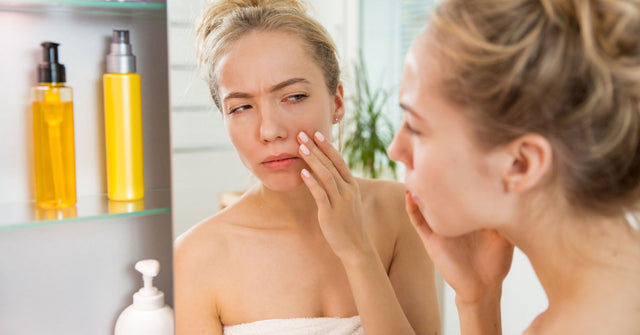Most people with oily skin want to remove every bit of grease on their face for a fresher and cleaner look. What about moisturizers? This beauty product might be too much for those who have oily skin, right? Well, not really.
You shouldn’t skip the moisturizer even if your skin type is on the oily side. You just need to find a good product that fits your skin type. The ideal oily skin moisturizer can decrease abnormal sebum production in the skin and can also provide other benefits. Want to learn how to moisturize greasy skin? You are in the right place! The discussion below should guide you in dealing with your oily skin.
Oily Skin: An Overview
Oily skin is a common skincare problem. Studies show that an oily complexion happens when oversized oil glands create too much sebum and leave the skin looking greasy and shiny. Sebum is a sticky substance that the body produces to lubricate the skin. Sebum overproduction leads to bumps, pimples, blackheads, and pore enlargement. The oiliness appears on the T-zone, which is your chin, nose, and forehead.
What Is a Moisturizer?
A face moisturizer is a cream, lotion, balm, or ointment packed with hydrating properties. These products are designed to boost water content in the outer skin layers. Their purpose is to seal the skin, trapping essential nutrients and moisture, while protecting the skin from external irritants.
Research indicates that water helps tissues become more flexible. It is also a key part of the reactions that break the connections between skin cells, allowing them to shed during the skin renewal process.
How Do You Know If You Have Oily Skin?
Observe your face and check for any signs of greasy skin. Here is how:
- Do a morning check. If the face looks very shiny, especially in the T-Zone, then you probably have an oily complexion.
- Recheck the skin during lunch. Press a blotting paper against your face. If the paper has absorbed the excess oil, and most of that oil is focused on the T-Zone, this is another sign of greasy skin.
- Do a post-cleansing check. Wait about 1 hour after you wash your face. If the skin quickly turns oily and feels “unclean”, then you have an oily complexion.
- Look at abnormalities. People with oily skin tend to have larger pores and acne-prone skin, explains the Journal of Clinical and Aesthetic Dermatology.
Causes of Oily Skin
The sebaceous glands are found all across your skin. But, the overly active ones are on your face, scalp, and upper body. Many factors can contribute to an oily skin complexion.
1. Genetics
Your genes can influence sebum production. Typically, the bigger your pores, the greater the amount of oil your skin creates. Pore size may differ based on family background and ethnicity.
2. Hormonal Changes
The sebaceous glands have a very strong reaction to androgens such as testosterone. When there are more androgens in your bloodstream, they attach to your sebaceous glands. This forces your skin to produce more oil. Both women and men generate androgens, especially in puberty. A face moisturizer for oily skin can help with that.
3. Environmental Factors
Warm and humid conditions often trigger more sebum production, resulting in extra oil on the skin. On the flip side, in dry or cold weather, the skin may become parched, causing oil glands to work overtime to make up for the dryness.
Characteristics of Oily Skin
There are a couple of signs that indicate you may have oily skin.
Your skin feels oily or greasy to the touch.
There are oily-looking (shiny) areas on your face, especially your chin, nose, and forehead.
The pores look enlarged and more visible from a distance.
You might experience frequent acne breakouts.
Because of the oiliness, makeup wears off quickly.
Foundations with a radiant finish make the skin look too greasy, while matte foundation looks better.
The wrinkles are less visible.
According to Skin Research & Technology, it is normal to experience hygienic and esthetic discomfort due to oily skin. The extra sebum can enlarge and block the pores and even lead to seborrheic dermatitis.
An oily skin moisturizer can rejuvenate the skin and manage oil production.
Does Oily Skin Need a Moisturizer?
Yes, it does. A face moisturizer for oily skin helps your skin in several ways. It can repair the skin barrier, keeping it healthy and looking good. Moisturizers act as emollients, humectants, and occlusive, each with its mechanism of action.
These products improve skin hydration by delivering water directly to your skin and reducing water loss. They also cover tiny skin cracks, create a protective layer, and shield your skin from friction, research shows.
When you apply moisturizer, it smooths your skin by reducing flakiness. It also helps the skin's natural fats absorb, retain, and distribute water.
By making your skin more hydrated, moisturizers help break down dead skin and prevent it from accumulating. As a result, the best face moisturizer for oily skin can keep your skin smooth and nourished.
Benefits of Using a Moisturizer
Just because your skin feels oily, it doesn’t mean it has the right hydration. The function of oily skin moisturizer is to hydrate the skin, balance sebum production, and keep it safe from environmental stressors.
1. Hydration
Applying the best face moisturizer for oily skin after cleansing replenishes lost moisture. This helps you reduce the odds of skin dehydration, infection, and inflammation. It also prevents the sebaceous glands from going into overdrive.
2. Balance of Oil Production
A face moisturizer for oily skin is specifically designed to regulate your natural water and oil levels so it won’t make your skin feel extra greasy.
3. Protection from Environmental Stressors
The best face moisturizer for oily skin creates a protective layer on the surface of the skin. This layer acts as a barrier that shields the skin from cigarette smoke, car exhausts, UV rays, and other environmental aggressors.
How to Choose the Right Moisturizer for Oily Skin
To pick the right oily skin moisturizer, you need to strike the perfect balance. Too little hydration can leave your skin parched, while an excess of oil can lead to greasy skin. Here is how to meet the moisturizing needs of your complexion.
Things to avoid:
-
Thick lotions and creams: They may sit on the skin, causing clogged pores and excess greasiness.
-
Oil-based moisturizers with mineral oil, petrolatum, or petroleum: These ingredients have the potential to clog or block the pores of the greasy skin.
What to look for:
-
Water-based gel formulas: They're lighter than oil-based products. They can balance your skin's moisture while making you feel rejuvenated.
-
Non-comedogenic: These won't clog pores. This reduces the risk of whiteheads and blackheads.
The Infusoderm Deep Hydration Daily Moisturizer is a perfect example of a product that is suitable for oily skin. This ultra-light moisturizer is a game-changer for your complexion. With it, you can feel an instant burst of refreshment. It also supplies potent antioxidants that can revitalize, brighten, and hydrate the skin.
Lifestyle Tips for Managing Oily Skin
Other than using an oily skin moisturizer, you can incorporate some lifestyle changes that can decrease the appearance of greasy skin.
1. Healthy Diet
To give the skin the nourishment, vitamins, and minerals it needs, you should swap refined carbs with whole grains, and replace red meats with fish or poultry. You can also enjoy more avocado, flaxseed, and olive oil.
Limit the intake of highly processed and greasy foods, as well as added sugar.
2. Hydration
Drink more water. This can balance the water and oil content of the skin. You should be drinking anywhere from 64 to 80 ounces of water daily.
3. Stress Management
Stress can cause a hormonal imbalance. When you incorporate relaxation techniques, meditation, physical activity, or any habit that can keep your mind at ease, you can manage the excess oil production in the skin.
Skin Care Routine for Oily Skin
Don’t know how to take care of your complexion? The step-by-step guide below will help.
Step 1: Cleanse
Cleansers are designed to remove and dissolve any excess oil or residue that accumulates on the skin. The Dermpura Skin Balancing Cleanser, not only cleanses the skin but also soothes irritation and provides antioxidant protection.
Step 2: Exfoliate
Exfoliation means getting rid of any dead skin cells. Some people with sensitive skin prefer to use a mild exfoliator or a washcloth. Whatever exfoliation method you choose, make sure to be gentle with your skin.
Step 3: Toner
The Maxatone Clarifying Toner is a gentle product that cleanses and purifies the skin. Thanks to its soothing formula, it can ease irritation and redness.
Step 4: Serum
A serum can provide potent ingredients for your skin. It can penetrate the skin and provide an ample concentration of active ingredients.
Step 5: Moisturize
Apply an oily skin moisturizer on damp skin. Use enough product to cover the neck, hairline, ears, and décolletage.
Step 6: Eye Cream
Take a pea-sized amount of product from your favorite eye cream and tap it between the fingers to warm it up before you massage it on the face.
Step 7: Sunscreen
Apply the product to the parts of the skin that will be fully exposed to the sun, especially if you go out during the day.
FAQ
Is moisturizer good for oily skin?
Yes. The right moisturizer for your skin type hydrates the skin, and locks in nutrients and moisture.
Can an oily skin moisturizer help with acne?
Applying a moisturizer is not necessarily bad for acne-prone skin. Moisturizers for oily skin are meant to regulate sebum production.
Will an oily skin moisturizer clog my pores?
Not all ingredients in moisturizers have the same compounds. Heavy lotions and creams can clog the pores. On the other hand, light moisturizers specifically designed for oily skin will help mitigate these problems.
Conclusion
Maintaining healthy-looking skin may seem difficult when your body produces too much sebum. However, paying close attention to the products you apply is the best way to take care of this concern.
If you can’t find a skincare routine that suits you and continue to experience problems, talk to a dermatologist. They can suggest the best course of action to help you find a solution for your oily complexion.
References
1] https://pubmed.ncbi.nlm.nih.gov/22722766/
2] https://www.ncbi.nlm.nih.gov/books/NBK545171/
3] https://www.ncbi.nlm.nih.gov/pmc/articles/PMC5605215/
4] https://www.verywellhealth.com/oily-skin-5095863
5] https://www.ncbi.nlm.nih.gov/pmc/articles/PMC9907625/
6] https://www.ncbi.nlm.nih.gov/pmc/articles/PMC5849435/
7] https://olay.co.uk/skin-care-tips/oily-skin/find-out-your-skin-type
8] https://www.medicinenet.com/what_is_a_moisturizer_used_for/article.htm
9] https://www.healthline.com/health/oily-skin-causes#skin-care
Mentioned in this article
More stories

Managing Dry Skin Acne: Effective Skin Care Tips






